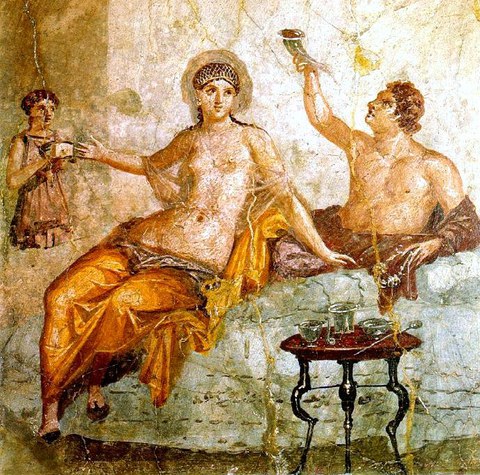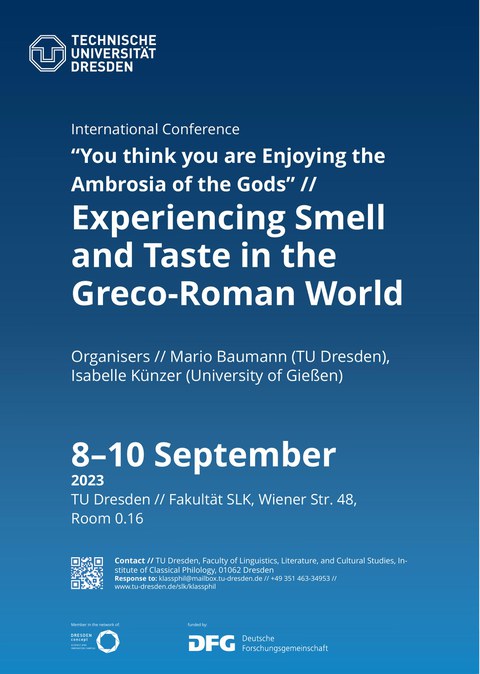Jun 13, 2023
“You think you are enjoying the ambrosia of the gods”: Experiencing smell and taste in the Greco-Roman world
The senses of smell and taste were already considered to be inferior senses in antiquity, since both seemed to be associated with significantly lower cognitive achievements compared to the work of the other senses. This attitude found its contemporary expression in ancient literary testimonies and went on to have a long lasting effect on the study of the ancient world. As a consequence, smelling and tasting as processes of sensory perception were neglected for a long time. However, the ancient evidence for both sensory modalities is extremely rich.
The senses of smell and taste are not only directly adjacent, but are also closely connected anatomically and neurophysiologically. Such a close connection is already evident, for example, in Cicero, who, in a consideration of them both, grants both senses the capacity for cognition, but goes on to classify it as deficient (cf. Cic. ac. 2.20). A joint investigation of the perception of smell and taste in the ancient world is therefore particularly suitable for illuminating culture-specific patterns of perception and discursive practices. The international conference, which will take place in Dresden from 8 to 10 September 2023, is dedicated to this concern.
Overview of the conference programme
- Date: 8 – 10 September 2023
- Venue: W48/016
- PDF with detailed conference programme
- PDF with abstracts of the papers
Thursday, 7 September 2023 (Arrival)
Welcome and introduction to topics and methods of the conference followed by a walk together through the old town of Dresden
Friday, 8 September 2023
Focus I: Structures: Ordering the spheres of taste and smell (9–10.30 a.m.)
| John Wilkins (Exeter) | Galen on Flavours and Smells |
| Giuseppe Squillace (Rende) | So Fragrant, so Unusable! The ‘Strange Cases’ of Citrus and Narcissus in Ancient Perfumery |
Focus II: Negative concepts: Repulsive smell and taste (11–12.30 p.m.)
| Bernadette Descharmes (Braunschweig) | Der Gestank der Großstadt – Zur olfaktorischen und moralischen Bewertung urbaner Kultur in der römischen Kaiserzeit |
| Isabelle Künzer (Gießen) | „Warum schmeckt Dir nur stinkendes Zeug?“ Ekel und Geschmackswahrnehmung im antiken Rom |
Focus III: Empty spaces: Implicit and missing smell and taste perception (2–3.30 p.m.)
| Mario Baumann (Dresden) | Olfaktorische Leerstellen: Paradoxe Geruchslosigkeit und Leseerlebnis in der griechischen Literatur |
| Helge Baumann (Gießen) | Jenseits der Wahrnehmungsschwelle? Implizite Geruchs- und Geschmackswahrnehmung in Ovids Metamorphosen und bei Seneca tragicus |
Focus IV: Poetics: Taste as a metaliterary phenomenon (4–5 p.m.)
| Stefan Feddern (Kiel) | How do Poems taste? The Ancient Discussion about the Effects of Poetry |
| Leon Schmieder (Zürich) | Verkostung im Text. Sapor und (Über)sättigung in den Saturnalien des Macrobius |
Saturday, 9 September 2023
Focus V: Domestic space: The Roman domus as a world of taste and smell (9–10.30 a.m.)
| Hannah Platts (London) |
Smelling and Tasting Status in the Roman Domestic Realm |
| Laura Nissin (Aarhus) |
Sensing the Roman Kitchen |
Focus VI: Performative space: Experiences of taste and smell at the theatre (11–12.30 p.m.)
| Afroditi Angelopoulou (Los Angeles) |
Making Sense of Aristophanes’ Taste |
| Raffaella Viccei (Brescia) | Smell and Taste in the Roman Theatres of the Imperial Age. An Overview through Ancient Literary Testimonies and Archaeological Documentation |
Focus VII: Natural space: The literary construction of landscapes of taste and smell (2–3.30 p.m.)
| David Solé Gimeno (Barcelona) | Paradoxical Smell and Taste in a Second Sophistic’s Fiction |
| Giampiero Scafoglio (Nizza) | The Smell as a Distinctive Feature of the locus amoenus in Late Antique Poetry |
Focus VIII: Didactics: Sensory experiences of smell in didactic poetry (4–5 p.m.)
| Lukas Spielhofer (Graz) | Smoke-hued, Hissing, Heavy-scented: The Theriaca of Nicander – A Multi-Sensory Experience |
Sunday, 10 September 2023
Focus IX: Practising faith: Taste and smell in the Christian world (9–10.30 a.m.)
| Bettina Reese (Halle) |
„Widerwärtige Viehverfeuerungen“? – Geruchsbilder in der christlichen Reflexion über das Opfer |
| Kyriakoula Tzortzopoulou (London) |
Thinking of Emotions through the Senses: The Moral Dimension of Smell and Taste in Early Christianity |


